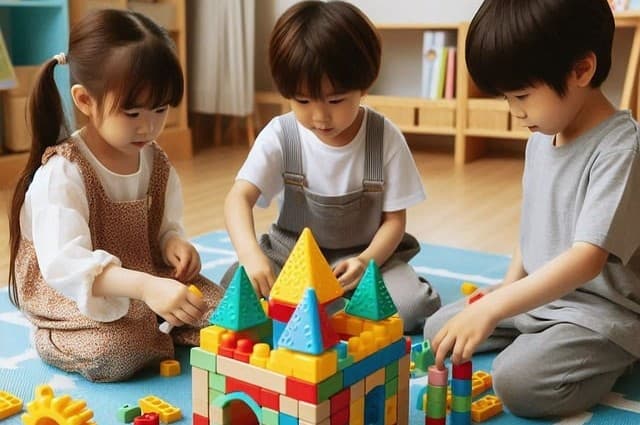Piaget’s Preoperational Stage: Early Symbolic Thinking

Piaget’s Preoperational Stage, the second stage in his theory of cognitive development, spans from age 2 to approximately age 7. During this stage, children begin to develop symbolic thinking, allowing them to use words and images to represent objects and ideas. However, their thinking is still limited by egocentrism and challenges with concepts like conservation.
An Overview of the Preoperational Stage
The Preoperational Stage is the second stage in Piaget’s stage of cognitive development. It follows the Sensorimotor Stage and precedes the Concrete Operational Stage, marking a shift from sensory-driven exploration to symbolic thinking. At this stage, children begin to represent the world through symbols, such as language, drawings, and pretend play.
However, their thinking remains intuitive and egocentric, with a limited grasp of logic and perspective-taking.
Breaking Down the Substages
Piaget divided the Preoperational Stage into two distinct substages to capture the progression of cognitive abilities.
Symbolic Function (Ages 2–4)
During this phase, children develop the ability to mentally represent objects and engage in pretend play.
Key characteristics :
- Egocentrism: Difficulty in understanding viewpoints other than their own. A classic example is Piaget’s “Three Mountain Task,” where children often assume others see the same view they do.
- Animism: Assigning human characteristics to non-living objects, such as saying “the moon is following me.”
Intuitive Thought (Ages 4–7)
Children begin asking questions and developing reasoning abilities, but their thinking is still not grounded in logic.
Key characteristic :
- Lack of Conservation: Struggling with the concept that quantity remains unchanged despite changes in shape or appearance, such as when water is poured from a tall glass into a short, wide bowl.
By distinguishing these substages, Piaget highlighted the gradual nature of cognitive growth, showing how children’s thinking becomes more complex but still remains limited compared to older stages.
Key Concept: Egocentrism
Three Mountains task
A 3D model with three distinct mountains is used, where children view it from one angle while a doll is positioned at another. They are asked to choose a picture or describe what the doll sees from its perspective.
In the task, younger children described what a doll on the other side of the model could "see," but typically gave responses aligned with their own perspective. This inability to adopt another's view supported Piaget's claims of egocentrism during early development [1][1].
Modern Research
Subsequent studies suggested that Piaget's task may have been too complex for younger children. Simplified tasks showed that children as young as 4–5 years can adopt others' perspectives under certain conditions [3][3].
Modern work on Theory of Mind (ToM) focuses on children’s ability to understand that others may have beliefs, desires, or intentions different from their own. Tasks like the False Belief Task show that children as young as 4–5 years can grasp others' mental states[4][4].
Cultural differences impact the development of perspective-taking abilities. Studies have found that children from collectivist cultures may exhibit less egocentrism earlier due to the emphasis on interpersonal awareness [5][5].
Key Concept: Conservation
Liquid Conservation Task
Two identical glasses with the same amount of liquid are presented. The liquid from one glass is poured into a taller, narrower glass, while the other glass remains unchanged.
Piaget's classic conservation tasks (e.g., liquid, number, mass) demonstrated that young children struggle with conservation until they reach the Concrete Operational Stage (around age 7). His findings suggested that cognitive development progresses through distinct stages, each marked by the increasing ability to understand abstract concepts like conservation.
Piaget proposed that children in the Preoperational Stage are unable to understand conservation due to centration (focusing on one aspect of an object or problem while ignoring other relevant aspects) and irreversibility (inability to mentally reverse or undo an action).
However, modern research has challenged Piaget's conclusions. Studies show that children may acquire conservation skills earlier than Piaget suggested, depending on task complexity and cultural context. For instance, simpler tasks or those involving familiar, concrete objects can yield better performance in younger children[6][6].
Applications in Play and Learning
The Preoperational Stage profoundly influences how children interact with their environment. Their cognitive development is reflected in their play behaviors and early learning experiences.
Pretend Play
Pretend play becomes a central activity during this stage. Through role-playing as parents, doctors, or superheroes, children practice symbolic thinking and social roles. Research shows that pretend play is linked to the development of creativity and problem-solving skills [7][7].
Educational Approaches
Educators and parents can foster growth by :
- Encouraging open-ended questions to stimulate reasoning.
- Using concrete, visual aids for teaching abstract concepts, such as counting blocks for arithmetic.
- Promoting interactive activities that require perspective-taking, such as storytelling or collaborative games.
- Promote language development by engaging in regular conversations, storytelling, and encouraging children to verbalize their actions and thoughts during play.
- Simplify and repeat instructions by breaking them into small, clear steps and using repetition to reinforce learning.
Conclusion
Piaget’s Preoperational Stage offers a fascinating glimpse into how young children perceive and engage with the world. While some aspects of his theory have been questioned, the overarching framework remains invaluable for understanding early cognitive development. Parents, educators, and psychologists can draw on these insights to create supportive environments that nurture children’s growth during this critical phase.
By combining Piaget’s foundational ideas with contemporary research, we gain a nuanced perspective on how children develop, emphasizing both universal patterns and individual differences. This holistic understanding allows us to better support the next generation as they build the cognitive and social skills necessary for lifelong learning and interaction.